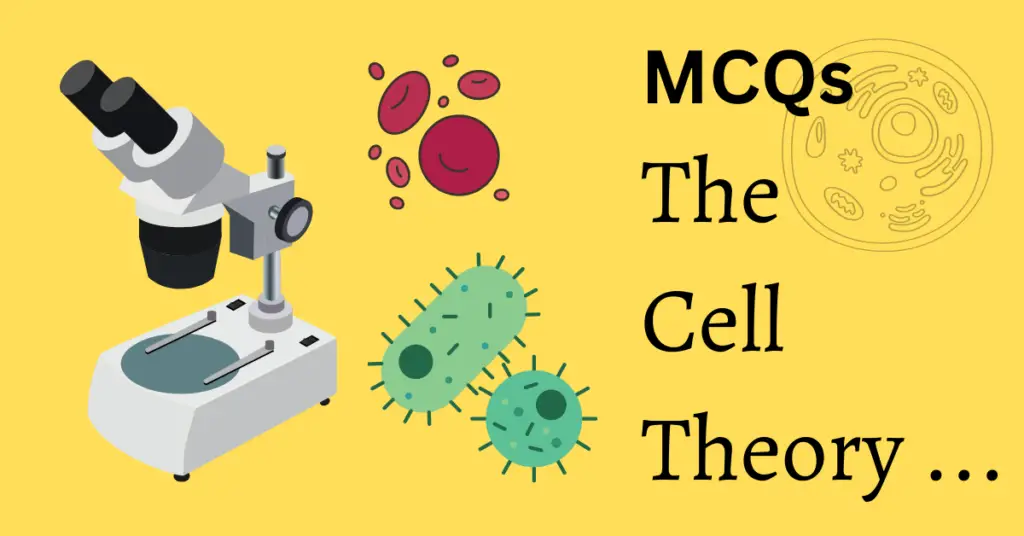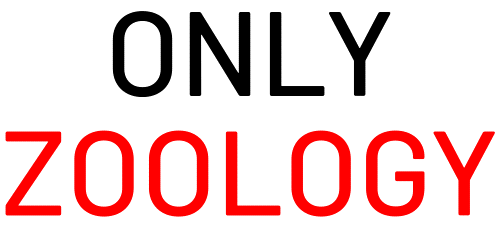40+ Cell Biology MCQs On – The Cell Theory (Cells: The Basic Unit of Life)

1. Who first observed that all plants are composed of different kinds of cells?
- A) Theodore Schwann
- B) Matthias Schleiden
- C) Rudolf Virchow
- D) None of the above
- Answer: B) Matthias Schleiden
2. Who concluded that the presence of a cell wall is a unique character of plant cells?
- A) Theodore Schwann
- B) Matthias Schleiden
- C) Rudolf Virchow
- D) None of the above
- Answer: B) Matthias Schleiden
3. Who proposed the hypothesis that the bodies of animals and plants are composed of cells and products of cells?
- A) Theodore Schwann
- B) Matthias Schleiden
- C) Rudolf Virchow
- D) None of the above
- Answer: A) Theodore Schwann
4. Who explained that cells divided, and new cells are formed from pre-existing cells?
- A) Rudolf Virchow
- B) Theodore Schwann
- C) Matthias Schleiden
- D) None of the above
- Answer: A) Rudolf Virchow
5. What is the first principle of the cell theory?
- A) All living organisms are composed of cells.
- B) All cells arise from pre-existing cells.
- C) Both A and B
- D) None of the above
- Answer: A) All living organisms are composed of cells.
6. What is the second principle of the cell theory?
- A) All living organisms are composed of cells.
- B) All cells arise from pre-existing cells.
- C) Both A and B
- D) None of the above
- Answer: B) All cells arise from pre-existing cells
7. Who modified the hypothesis of Schleiden and Schwann to give the cell theory its final shape?
- A) Rudolf Virchow
- B) Theodore Schwann
- C) Matthias Schleiden
- D) None of the above
- Answer: A) Rudolf Virchow
8. What is the meaning of “Omnis cellula-e cellula”?
- A) All living organisms are composed of cells.
- B) All cells arise from pre-existing cells.
- C) Both A and B
- D) None of the above
- Answer: B) All cells arise from pre-existing cells
9. Which of the following is NOT a fundamental principle of the cell theory?
- A) All living organisms are composed of cells.
- B) All cells arise from pre-existing cells.
- C) New cells can arise spontaneously.
- D) None of the above
- Answer: C) New cells can arise spontaneously
10. The discovery of the cell and the formulation of the cell theory marked a major turning point in the history of which field?
- A) Physics
- B) Chemistry
- C) Biology
- D) None of the above
- Answer: C) Biology
11. What did Theodore Schwann observe about animal cells?
- A) They have a thin outer layer known as the plasma membrane.
- B) They have a unique character called the cell wall.
- C) They are not composed of cells.
- D) None of the above
- Answer: A) They have a thin outer layer known as the plasma membrane
12. What did Rudolf Virchow first explain about cell division?
- A) New cells can arise spontaneously.
- B) New cells are formed from pre-existing cells.
- C) Both A and B
- D) None of the above
- Answer: B) New cells are formed from pre-existing cells.
13. What is the function of the cell wall in plant cells?
- A) To regulate the movement of substances in and out of the cell.
- B) To protect the cell from damage.
- C) To provide structure and support to the cell.
- D) None of the above
- Answer: C) To provide structure and support to the cell
14. What is the unique character of animal cells according to Theodore Schwann?
- A) The cell wall
- B) The plasma membrane
- C) The cytoplasm
- D) None of the above
- Answer: B) The plasma membrane
15. What is the unique character of plant cells according to Matthias Schleiden?
- A) The cell wall
- B) The plasma membrane
- C) The cytoplasm
- D) The Endoplasmic Reticulum
- Answer: A) The cell wall
16. Who first proposed the cell theory?
- A) Theodore Schwann
- B) Matthias Schleiden
- C) Rudolf Virchow
- D) Both A and B
- Answer: D) Both A and B
17. What is the basic building block of life?
- A) Proteins
- B) DNA
- C) Cells
- D) Lipids
- Answer: C) Cells
18. What are the basic functions of life carried out by cells?
- A) Respiration
- B) Reproduction
- C) Growth
- D) All of the above
- Answer: D) All of the above
19. Which principle of the cell theory states that cells are the smallest units that can carry out all the basic functions of life?
- A) All living organisms are composed of cells
- B) Cells are the structural and functional units of life
- C) All cells arise from pre-existing cells
- D) None of the above
- Answer: B) Cells are the structural and functional units of life
20. Which principle of the cell theory states that new cells are produced from pre-existing cells through cell division?
- A) All living organisms are composed of cells
- B) Cells are the structural and functional units of life
- C) All cells arise from pre-existing cells
- D) None of the above
- Answer: C) All cells arise from pre-existing cells
21. What is the significance of the cell theory in biology?
- A) It explains how living organisms are organized and how they function
- B) It provides a framework for understanding the relationship between structure and function in cells
- C) It explains how cells interact with one another to form tissues, organs, and organisms
- D) All of the above
- Answer: D) All of the above
22. What technological advances have been made possible by the study of cells?
- A) Understanding the causes of many diseases
- B) Developing new treatments for diseases
- C) Advances in microscopy and other imaging techniques
- D) All of the above
- Answer: D) All of the above
23. What is the main implication of the cell theory for biology?
- A) Cells are the basic units of life
- B) Cells are responsible for all the basic functions of life
- C) Cells are responsible for the structure and function of living organisms
- D) All of the above
- Answer: D) All of the above
24. Which scientist modified the cell theory to include the principle that all cells arise from pre-existing cells?
- A) Theodore Schwann
- B) Matthias Schleiden
- C) Rudolf Virchow
- D) Louis Pasteur
- Answer: C) Rudolf Virchow
25. Which principle of the cell theory explains how living organisms are organized?
- A) All living organisms are composed of cells
- B) Cells are the structural and functional units of life
- C) All cells arise from pre-existing cells
- D) None of the above
- Answer: A) All living organisms are composed of cells
26. Which principle of the cell theory explains how cells interact with one another to form tissues, organs, and organisms?
- A) All living organisms are composed of cells
- B) Cells are the structural and functional units of life
- C) All cells arise from pre-existing cells
- D) None of the above
- Answer: B) Cells are the structural and functional units of life
27. Which of the following statements is part of the modern cell theory?
- A) All cells are the same in chemical composition
- B) All cells contain DNA
- C) All cells are prokaryotic in nature
- D) All cells are capable of photosynthesis
- Answer: B) All cells contain DNA
28. Which of the following statements is part of the modern cell theory?
- A) Cells are not the fundamental unit of structure and function in all living organisms
- B) All living cells arise spontaneously from non-living matter
- C) Energy flow occurs outside of cells
- D) The activity of an organism depends on the total activity of independent cells
- Answer: D) The activity of an organism depends on the total activity of independent cells
29. Which of the following statements is part of the modern cell theory?
- A) Cells do not contain any genetic material
- B) All living things are made up of at least one cell
- C) All cells have a similar structure and function
- D) Energy flow occurs between cells
- Answer: B) All living things are made up of at least one cell
30. Which of the following statements is part of the modern cell theory?
- A) Cells can arise spontaneously from non-living matter
- B) The structure of a cell has no relation to its function
- C) All cells arise from pre-existing cells
- D) The activity of an organism is determined by its environment, not by its cells
- Answer: C) All cells arise from pre-existing cells
31. What invention allowed for the observation of cells?
- A) Telescope
- B) Binoculars
- C) Microscope
- D) Camera
- Answer: C) Microscope
32. Why did Robert Hooke use the term “cell” to describe the structures he observed in cork?
- A) Because the cells were occupied by monks
- B) Because the cells reminded him of prison cells
- C) Because the cells were rectangular like cells in a spreadsheet
- D) Because the cellulose walls of the cells resembled blocks occupied by monks
- Answer: D) Because the cellulose walls of the cells resembled blocks occupied by monks
33. What did Antonie van Leeuwenhoek observe that extended the known variety of living things?
- A) Blood cells
- B) Spermatozoa
- C) Unicellular organisms
- D) All of the above
- Answer: D) All of the above
34. Who was the first to observe the nucleus in plant cells?
- A) Antonie van Leeuwenhoek
- B) Robert Brown
- C) Matthias Schleiden
- D) Theodor Schwann
- Answer: B) Robert Brown
35. What was the critical discovery made during the 1830s that led to the development of cell theory?
- A) The discovery of DNA
- B) The discovery of mitochondria
- C) The discovery of the nucleus
- D) The discovery of the plasma membrane
- Answer: C) The discovery of the nucleus
36. What is protoplasm?
- A) A living substance found in cells
- B) A dead substance found in cells
- C) A chemical used to stain cells
- D) A tool used to observe cells
- Answer: A) A living substance found in cells
37. What was the main reason for the delay in the formulation of cell theory?
- A) Lack of interest in studying cells
- B) Poor quality of microscopes
- C) The persistence of ancient ideas
- D) The absence of living material in cells
- Answer: C) The persistence of ancient ideas
38. According to cell theory, what is the basic unit of life?
- A) The atom
- B) The molecule
- C) The cell
- D) The organ
- Answer: C) The cell
39. Who proposed the idea that all living things are made up of cells?
- A) Robert Brown
- B) Antonie van Leeuwenhoek
- C) Matthias Schleiden
- D) Theodor Schwann
- Answer: D) Theodor Schwann
40. What is the function of the nucleus in a cell?
- A) To produce energy
- B) To store nutrients
- C) To regulate cell activity
- D) To provide structural support
- Answer: C) To regulate cell activity
41. What is the term used to describe the movement of protoplasm within a cell?
- A) Endocytosis
- B) Exocytosis
- C) Cytokinesis
- D) Cytoplasmic streaming
- Answer: D) Cytoplasmic streaming

